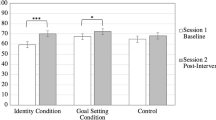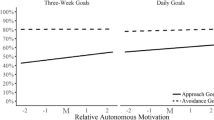Abstract
The present experiment tested the hypothesis that self-regulation of refractory behavior varies as a function of goal proximity. Obese subjects were assigned to conditions in which they either monitored their eating behavior, monitored their eating behavior and set subgoals for reducing the amount of food consumed, or received no treatment. Within the goal-setting conditions, subjects adopted either distal goals defined in terms of weekly goal limits or proximal goals specifying the goal limits for each of four time periods during each day. Goal setting enhanced self-directed change as measured by reductions in both eating behavior and weight. The higher the goal attainments, the greater were the losses in weight. Proximal and distal goal setting yielded comparable overall results because the majority of subjects assigned remote goals altered this condition by adopting proximal goals to augment control over their own behavior. Within the distal goal-setting condition, the adherents to distal goals achieved relatively small changes, whereas those who improvised proximal subgoals for themselves attained substantial reductions on the multifaceted measures of self-directed change. The combined evidence lends support to the motivational and regulative functions of proximal intentions and highlights the reciprocal influence processes that operate in self-directed change.
Similar content being viewed by others
References
Atkinson, J. W. A revised theory of achievement motivation. In J. W. Atkinson & N. T. Feather (Eds.),A theory of achievement motivation. New York: Wiley, 1966.
Bandura, A.Social learning theory. Englewood Cliffs, New Jersey: Prentice-Hall, 1977.
Bellack, A. S. A comparison of self-reinforcement and self-monitoring in a weight reduction program.Behavior Therapy 1976,7 68–75.
Fowler, R. S., Jr., Fordyce, W. E., Boyd, V. D., & Masock, A. J. The mouthful diet: A behavioral approach to overeating.Rehabilitation Psychology 1972,19 98–108.
Hagen, R. L., Foreyt, J. P., & Durham, T. W. The dropout problem: Reducing attrition in obesity research.Behavior Therapy 1976,7 463–471.
Jeffery, K. M.The effects of goal-setting on self-motivated persistence. Unpublished doctoral dissertation, Stanford University, 1977.
Kazdin, A. E. Self-monitoring and behavior change. In M. J. Mahoney & C. E. Thoresen (Eds.),Self-control: Power to the person. Monterey, California: Brooks/Cole, 1974.
Locke, E. A. Toward a theory of task motivation and incentives.Organizational Behavior and Human Performance 1968,3 157–189.
Mahoney, M. J. Self-reward and self-monitoring techniques for weight control.Behavior Therapy 1974,5 48–57.
Mahoney, M. J., & Thoresen, C. E.Self-control: Power to the person. Monterey, California: Brooks/Cole, 1974.
Romanczyk, R. G. Self-monitoring in the treatment of obesity: Parameters of reactivity.Behavior Therapy 1974,5 531–540.
Romanczyk, R. G., Tracey, D. A., Wilson, G. T., & Thorpe, G. Behavioral techniques in the treatment of obesity: A comparative analysis.Behaviour Research and Therapy 1973,11 629–640.
Steers, R. M., & Porter, L. W. The role of task-goal attributes in employee performance.Psychological Bulletin 1974,81 434–452.
Stunkard, A. J. From explanation to action in psychosomatic medicine: The case of obesity.Psychosomatic Medicine 1975,37 195–236.
Author information
Authors and Affiliations
Additional information
This research was supported by Public Health Research Grant MH-5162 from the National Institute of Mental Health. The authors wish to express their appreciation to Beth Ward for her assistance in the collection of data, and to Dr. Fred Volkmar for his helpful contributions to the exploratory work in this project.
Rights and permissions
About this article
Cite this article
Bandura, A., Simon, K.M. The role of proximal intentions in self-regulation of refractory behavior. Cogn Ther Res 1, 177–193 (1977). https://doi.org/10.1007/BF01186792
Issue Date:
DOI: https://doi.org/10.1007/BF01186792




